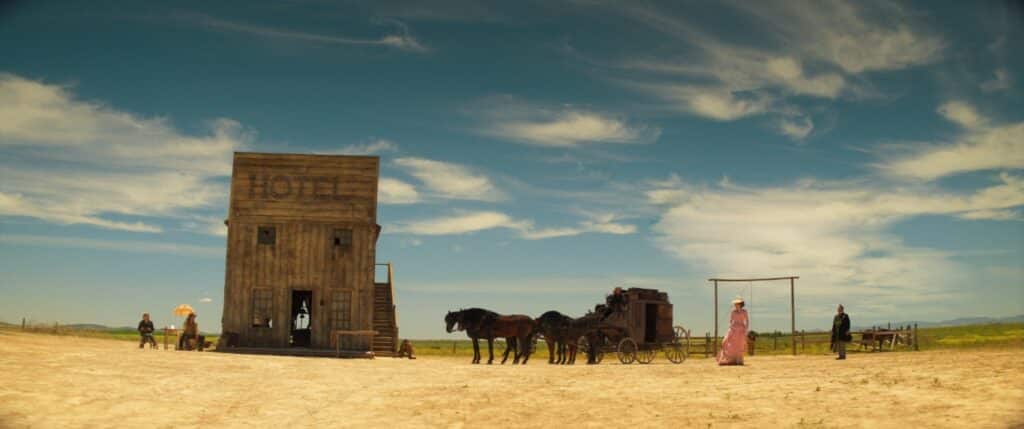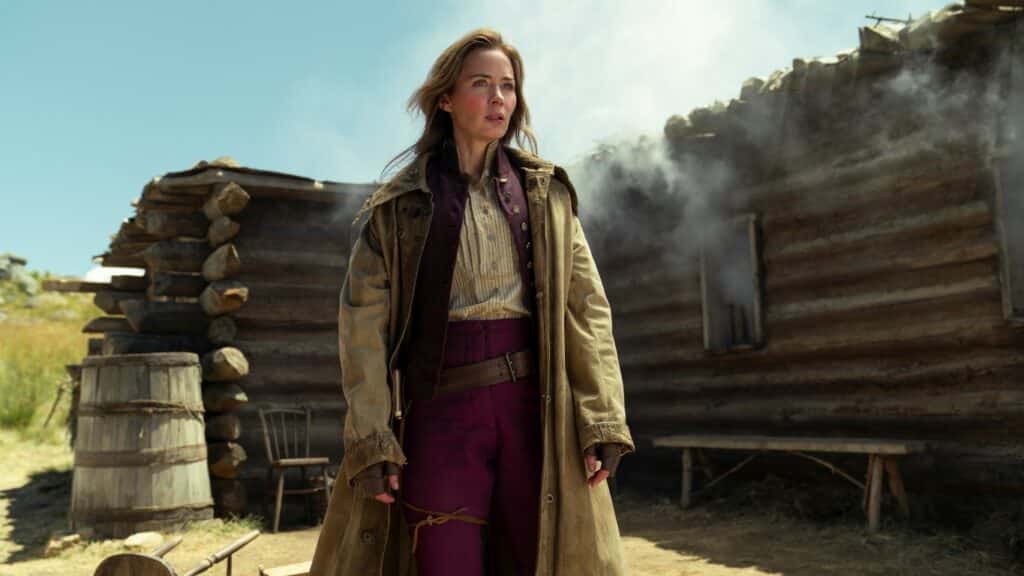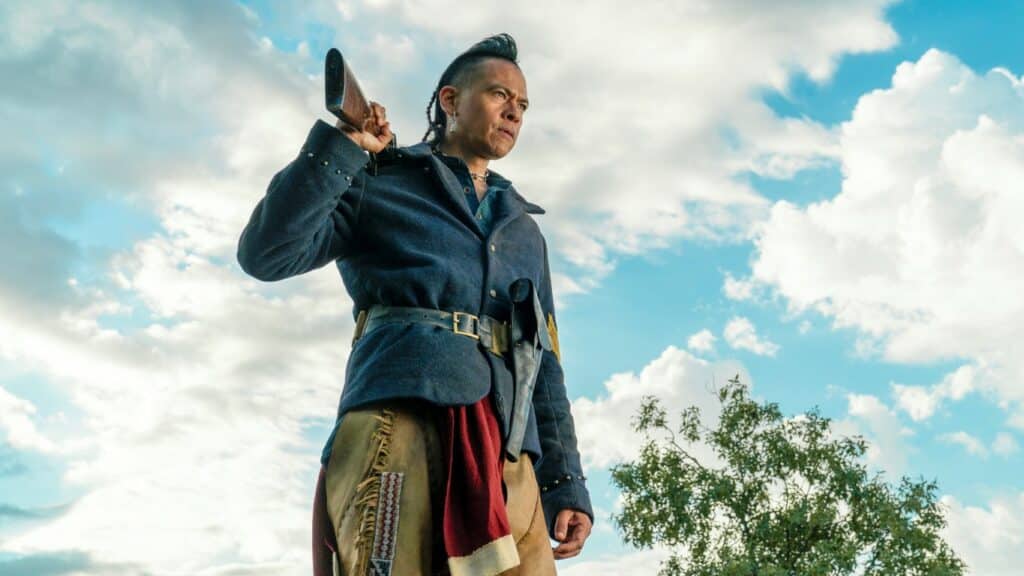Read also:
How to Watch FX Live Without CableHow To Watch AMC Without CableHow to Watch ABC Without CableHow to Watch Paramount Network Without CableEmily Blunt and Chaske Spencer carve a beguiling doomed romance against the backdrop of Hugo Blick’s intellectualized take on revenge in the Old West.
“Out there, back then…” That’s when The English takes place. “And in between…I wanted to kill a man for the murder of my child. You wanted back your land, stolen from you.” That is what The English is about.
Hugo Blick was, to Americans, just another functionary at the BBC, making dramas most Americans have never seen. By Andrew Sarris’ rules, we must call Blick an auteur; writer, producer, and director of shows like Operation Good Guys, The Honorable Woman, and Black Earth Rising. Bigger deals in the UK than in America. I think Blick knows this, as he’s deliberately titled his Western odyssey for Prime Video The English — the people Americans don’t understand, but who nevertheless made them. They think they’ve made everything, and thus own everything. The show aims to disabuse them of that notion.
The English concerns a former Pawnee scout for the US army named Eli Whipp (Chaske Spencer) who, in searching for his ancestral home in Nebraska, gets bushwhacked by cutthroats and winds up in the company of Cornelia Locke (Emily Blunt), an Englishwoman who’s come here looking for the men who ruined her life. When she arrives in “the real America,” she knows two things. One: her host (Ciarán Hinds) wants to rape her and kill her for the satchel full of money she’s brought with her. Two: the bound and tormented Whipp, who saves her from both fates, is her only hope of finding the man she means to find in this accursed country. Once they get quit of their first round of kidnappers, it’s only a matter of traveling thousands of miles on horseback, dispatching with gangs and despots along the way, until they both get what they want. But as Whipp says early on, “Never say how a thing gonna turn out til it does.”

What to make of The English… It’s six episodes of pure old-school portentous anti-mythologizing just as a how d’you do. Cinematographer Arnau Valls Colomer shoots it like a cross between a comic strip and a Spaghetti Western. Every episode has at least one unforgettably expressionistic composition, with Edward Hopper’s depth and strength and N.C. Wyeth’s propulsive motion. Editors Ben Yeates and Andy Morrison occasionally put together sequences like the best of the last 30 years of anime; Blick helps by pacing his series in odd, episodic fashion.
The show is in no hurry to go anywhere at all. Take the first episode’s big set piece: not the exciting gunfight between Eli, a typically excellent Toby Jones, and three gunhands out to do them harm, but rather the dinner between Hinds and Blunt. It is an endless scene, full of turns of phrase that must both communicate the plot points of which we’re unaware and also showcase Blick’s intelligence behind a typewriter.
That’s really the sticking point. This show isn’t content to walk a straight line between a woman who wants revenge and the getting of such; no there are galleys and peaks that must be crossed and re-crossed. Our heroes meet a couple who are in cahoots with a band of highwaymen. They kill the brigands on the road, then quickly get caught in the crossfire between warring gangs who want to take their place robbing and scalping travelers.

What does that have to do with anything? It doesn’t, which is pretty silly when you consider there are six episodes of this thing and three episodes max worth of plot. The rest are tangents and speeches that stretch to infinity. We never meet a single character without an introductory monologue. Which is fine in theory, how else will we get to know them, they all die soon after. But why do we bother getting to know characters with a scene’s worth of plot to them?
This pays off in a few instances – the more loathsome people are, the more satisfying it is to watch them get theirs – but a few times an episode is just too much speechifying. When we meet any given villain, there’s a good chance Blick will let them wander off on some unenlightening tangent. “I hope to have my own coat of arms someday, though I don’t know what I’d put on it…” isn’t really as revealing about a character so much as their heinous Cockney accent, dandy body language, effete mustache, and the fact that they kill and skin people for fun (looking at you, Rafe Spall). Between a picture and a thousand words, Blick chose not to choose.
His ending suffers for it – the villain spends more time talking than being villainous. Makes the final showdown with him rather anti-climactic; how do you satisfyingly pin a show on the hunting of a man you don’t really know? We know he talks too much, but in order for that to be met in a satisfying fashion (at least if we listen to Chekhov) would be to talk the man to death. The show certainly tries.
…This frequently infuriating show is often so beautiful I couldn’t stand it.
In the hands of a handful of Europeans, the Western of late has become a repository for talk of the importance of language. Mona Fastveld’s The World To Come, Paul Greengrass’s News of the World, and now this, are all about the way stories travel and knowledge and history with it. Spencer’s Whipp imparts to Blunt’s Locke that the way his people keep everyone alive in a country where you’re hunted for sport is to talk about them. This becomes the way she begins to relate to the world (she can’t find purchase any other way). She mourns what she’s lost; as much as she wants vengeance, she also wants to be able to explain her loss to people who might remember it. Who might actually listen. Everyone else just talks at her, taking and taking and taking her time, her energy and her life.
The issue is when Blick tries to make this not just subtext but text. There’s much dialogue delivered in hushed tones for nearly six hours, it’s easy to lose details unless you’re paying careful attention to every mumbled syllable. I watched every episode twice and even I missed things. It’s very easy to miss what’s being said and implied, the way these actors are directed to deliver. Your attention is rewarded with explosions of cathartic violence, and the end of the Byzantine mysteries snaking through this jittering narrative. Maybe it’s more accurate to say: this frequently infuriating show is often so beautiful I couldn’t stand it. Sometimes because the craft is stupefying, and sometimes the way the leads communicate their respect for each other.
Blunt must come across as both rube and wizard, someone who is at once naive in the way America conducts herself and the Americans burrowed into her like a tick likewise, but also someone savvy enough to cut Hinds to the quick at every rhetorical turn. No such person exists and it’s to Blunt’s credit she approximates a realistic portrait of such a writer’s fantasy and to Blicks’ discredit that he thought anyone should have to invent such a preposterous interiority from whole cloth. It’s encouraging to see Blunt playing a character she clearly loves and see that decision pay off so richly; she refines and clips her accent, knows which are the money lines, and delivers. This is as good as she’s ever been.

Even so, Spencer might have her beat. He’s been a busy fellow the last decade, but big parts in small movies and small parts in big ones have kept him from breaking through. This is a star-making turn. He’s mesmerizing as the only character who doesn’t vouchsafe twenty words when a nod will do. “You a father?” He’s asked at one point after betraying paternal instinct. “…been.” Is his reply.
That’s not just good acting, it’s good writing. Blick trusted this character to communicate the hard and horrible lives you live in America, and Spencer to play him so truthfully you cannot take your eyes off of him. Between Blunt’s flighty grandiloquence and Spencer’s dignified terseness, you have a tense dynamic, the drama coming from how these two meet in the middle. The show makes few missteps when focused on their growing ardor (the score by Federico Jusid also elevates this to high romantic beauty).
Not to say the rest is bad, or anything; just unfocused. It takes so long, for instance, to divine the meaning of a massacre, a mysterious branding, a cattle baron feud, and Blunt’s ex-fiancee, and frankly, only some of those elements actually become intrinsic to the narrative. This is fine when Blick can make them pull their weight imagistically – to return to the anime connection, there are villains in this with frightful appearances right out of Yasuhiro Nightow’s Trigun. Supporting turns from Hinds, Jones, Gary Farmer, William Belleau, Stephen Rea, and especially Valerie Pachner among others keep the show involved, even as its mind wanders.
The greatest compliment I can think to pay it is that now, having seen it twice, I’m sad each time I realize I can’t see the continuing adventures of its star-crossed heroes. They create such a world between them, spoken and not. It’s a bewitching place to be, to live in the possibilities they create and dissolve just as quickly. The English resembles a lot of things, but its effect is rather unlike anything else.
The English saddles up and rides off to Prime Video November 11th.